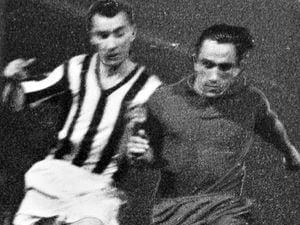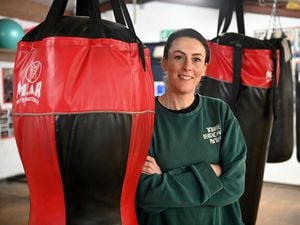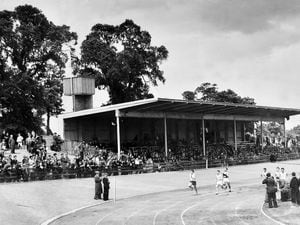Toby Neal: My heart was beating, which was a good sign
Great excitement. I got to ride in an ambulance!

My unplanned investigative journalism foray into the workings of the NHS began when I finally sat down after a day of pottering around the house and garden doing odd jobs.
For a couple of weeks there had been episodes in which I had felt that something was not quite right. Then while watching The Chase with Bradley Walsh, I felt that something definitely wasn’t right.
I was aware that my heart was beating – not a good sign in the circumstances, as you normally take it for granted – and I was short of breath.
So I rang NHS 111. They went through a list of questions, including whether I felt capable of making a cup of tea. I mulled it over and decided I could, but didn’t actually want a cuppa at that moment.
They said somebody would review my symptoms and they would either ring back or send an ambulance.
A little while later I said to my wife: “They’re sending an ambulance.” “How do you know?” “Because it’s coming up the road.”
The ambulance crew checked my stats and agreed with me. Something definitely wasn’t right. In particular my oxygen levels were dropping. As I got in they asked what I did for a living. “I’m a journalist.” “Who do you write for?” “Ambulance Inspector Weekly.”
They gave their names as Colin, Luke and John, to be quoted if I was giving a good write up, and Mufty, Spike, and Nosher, if I was going to give them a bad crit. I’ve made those names up as, sorry lads, I can’t remember your real names now, but I think one really was called Luke.
Being in the ambulance had a magical effect. I immediately began to feel worse. They put me on maximum oxygen. They batted ideas off each other about what might be wrong. I’m a double-jabber, but as a precaution they rang ahead to the hospital as Covid couldn’t be ruled out. Consequently on arrival I was treated as a potential Covid patient, being put in a room with a thick sliding glass door to seal it off.
After the initial kerfuffle, tests (negative for Covid), and an X-ray from which I was told the results were “suspicious”, I was transferred to the Acute Medical Unit at about 3.30am. A lady in blue sat at a desk catching up on paperwork in the dead of night.
The AMU had some interesting patients. Some, like me, you might not think were ill at all. Others, through age, infirmity, confusion, or as a consequence of their ailment, were more challenging for staff.
“You’re all mental in here,” one of them told the lady in blue.
“Ow!” cried a nurse loudly from behind the screen as she treated another.
Come the dawn.
“Toby Neal?” said the chap in the next bed. “I read your column.” Nobody else during my entire hospital stay admitted to reading my column. Such is life.
Then I was moved on to a ward where the other patients were John, John, John, and Ron. John told me that on the women’s ward they were Pat, Pat, Pat, Pat and Pat.
A cheerful nurse came round to do some more paperwork. Five pages for each patient, she said. Doing paperwork wasn’t the reason she became a nurse all those years ago.
All the beds had transparent plastic screens, no doubt a coronavirus measure.
“They need to put something on them so people can see them and don’t just walk into them. There have been two accidents,” said a staff member.
Of course being an open ward you can hear what other patients are saying when they speak to home.
“The service here in every respect is absolutely fantastic,” says John, or maybe Ron, in a call to a loved one.
As it happens I contribute to a private health scheme. “It’ll mean I’ll get better sandwiches in hospital,” is my standard explanation. In reality the NHS hospital food during my stay was very good.
The NHS has more uniforms than the British Army, and the people in maroon tops thought I might have a blood clot on my lung, so I go for a CT exam. That’s the one where you enter a machine like a doughnut. But first they injected me with a dye. “You’ll feel like you’ve wet yourself.” It’s true. It replicates the sensation with uncanny accuracy.
But no, I do not have a blood clot on my lung.
A chap in a maroon top took my pulse and concentrated. “I thought it missed a beat,” he said. “No, that’s all right,” he said a few seconds later. Then: “There! – it’s done it again.”
A young lad from Walsall appeared and started listening to my heart with an echo sounder. The display of my ticker was multi coloured and the output looked and sounded a bit like a disco (modern, not 1970s).
A little later the chap in the maroon top came to my bed.
“Unfortunately, Mr Neal, you have impairment of systolic function.”
I wasn’t sure at the time of the implications of the second part of that sentence, but I do know that any sentence which begins “unfortunately Mr Neal” does not impart good news.
So now I have lots of new friends which keep me in a vertical position. Their names are furosemide, Entresto, bisoprolol, eplerenone, atorvastatin, and good old dispersible aspirin.
This must be costing the NHS a small fortune. There again, I would point out that I have had a lifetime paying my taxes. And I’d like to think it is an investment.





